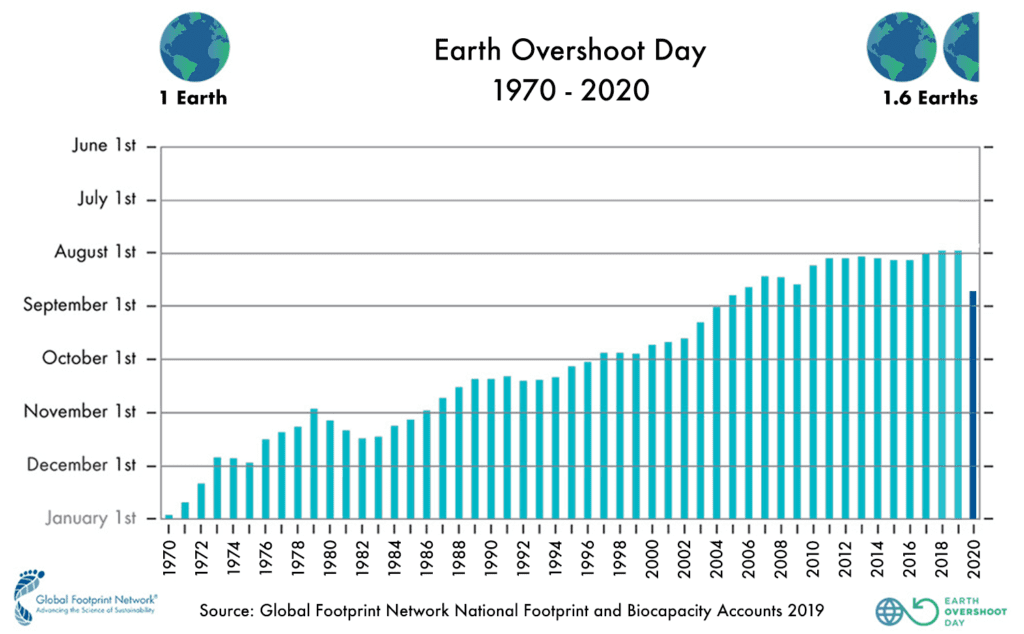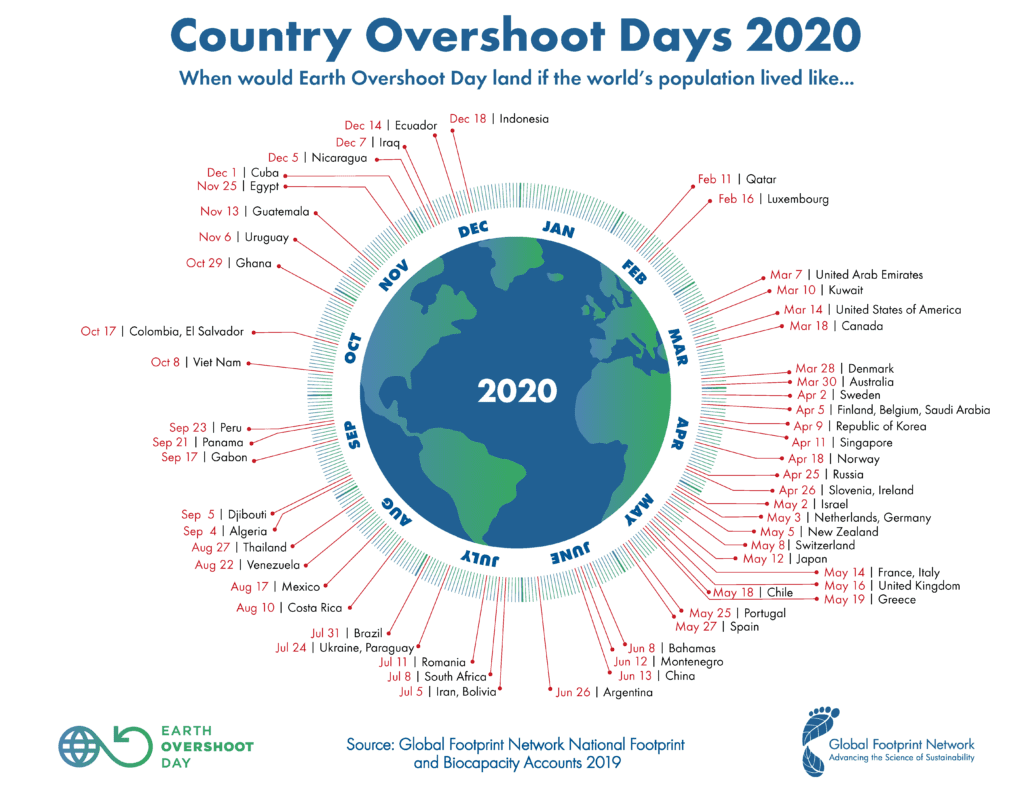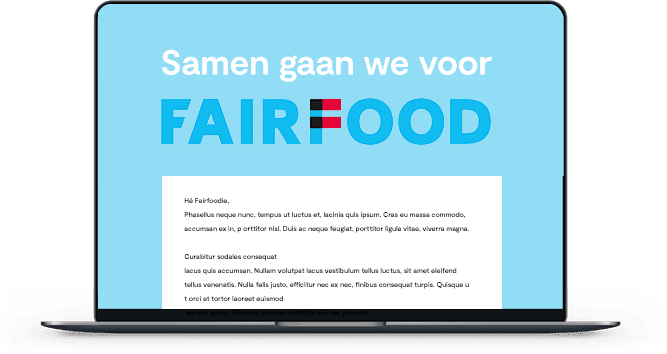World Overshoot Day: how (little) progressive we are towards sustainability
It took a global pandemic that has already cost more than 0.8 million deaths and around 1.6 billion job losses for humanity to cut down the use of Earth’s non-regeneratable resources. Big whoop: this year we used up our yearly resources only 23 days later compared to last year. So, are we really making headways towards sustainability?
This year, the world observed World Overshoot Day on the 22nd of August – a snoozing reminder that we have officially utilized all of nature’s biocapacity for this year, and that we are now living on ecological credit. While the day is an augury of our dying Earth, humanity is celebrating their 14.5% reduction in carbon footprint and 8.4% depletion in forest footprint, which to be honest, is only a serendipitous result of a ‘social-distancing’ crisis.

But aren’t we ignoring the fact that a horrendous catastrophe like COVID-19 could make us reduce our consumption footprint by only three weeks compared to last year? This interrogation is important because most countries are now bouncing back from the crisis with unfriendly environmental strategies. China’s surge in CO2 emission after the lockdown and France’s report of PPE’s ending up in water bodies are all testimonials to how easily we can go back to an unsustainable way of living.
Thus, it’s time we step out of our standard inquisitions of ‘how much did we change?’ and step forward to critically analysing ‘how little did we change?’.
The food crisis
When it comes to the year’s cutback in agriculture and food footprint, the answer actually is zero! Even when the pandemic has turned into a food crisis, with millions struggling to suppress their hunger, the footprint remains unchanged compared to 2019. Considering the fact that last year was the earliest day ever recorded in ‘overshoot calendar’, governments and corporates are now forced to expose a flaw that was ignored for years: the brittleness of food systems.
In most parts of the world, food supplies have come to a still. Farmers around the world have been unable to sell their produce at markets, graziers have no access to access animal feed, and plantation owners are struggling with shortage of workers to help with the harvest due to lockdown and self-isolation measures. These distresses have resulted in supply chains that are unable to react to the disruptions of the crisis. And even though this vulnerability is affecting the consumers in higher-income countries, farmers and plantation workers from lower-income countries are the ones who hit rock bottom with unharvested food and unattended fields.
If a pandemic that has only been hurting since a few months can cause such harsh repercussions, the aftermath of a crisis like climate change that can long for years will be impossible to survive for these communities.
Child marriages and suicides
On top of that, the climate crisis is already causing chain reaction in the socio-economical field; every environmental issue is a cause of greater social injustice. Statistics already show us the gist. According to a recent study published by Climate Impact Lab, the average death rate caused by climate change will have an enormous disparity between rich and poor countries. The study projects that climate crisis could raise global mortality rates by 73 deaths per 100,000 people in 2100[CB1] , but in less-advantaged countries, this rate could leap by an additional 200 or more deaths.
The repercussions are not just something that we may experience in a version of the predicted future. Since the genesis of capitalist societies, the higher-wealth communities have been looting the indigenous resources, and in return, turning their land into dumping grounds for deadly toxic pollutants. The long-term result is a widening disparity between who enjoys the benefits from activities that produce planet-warming gases and who suffers most from the consequences. This is already leaving us with a phenomenon that has only been intensifying since its beginning – environmental racism.
For farming communities in forsaken parts of the world, the climate crisis is effectuating even deeper social issues. Rising temperatures and decreasing harvest in many countries down the equator is now forcing children to get into labour to meet ends in a family, and young girls to get married, hoping that they will have a better living at the in-laws. When the emotional toll becomes too much to bear, the climate crisis gives impetus to even suicides.
Ecological surplus
It’s not a secret: the effects of climate crisis will be harsh for all of us, but it will be the worst for people who did the least to cause them. While the world’s richest nations are overshooting its biocapacity even before completing a quarter-year (e.g.: Qatar on February 11, Luxembourg on February 16 and USA on March 14), most agro-societies often reach the maximum only by the end of the year, or in some cases actually have an ecological surplus.

Thus, as countries that are contributing the most to this problem, we have a greater responsibility to find solutions as well. With every issue having a causal relationship, it is not enough to treat climate crisis in a vacuum; every step taken should consider the indirect effect it has on the society, especially on the less-privileged communities.
With visible changes in the climate as well as the density of its repercussions, many companies and governments around the world are now standing by the UN’s 2030 Agenda for Sustainable Development. Moreover, COVID-19 has opened up paradigms undiscussed till date – transparent supply chains, digital inclusion and operational sustainability.
Bringing back the end-of-the-year biocapacity rate that we used to have in the 1970s is not an easy – if not impossible – task. But let’s hope that the awareness that a major crisis like COVID-19 couldn’t change our consumption footprint much will instigate the need for a plan – a proposal for a ‘purpose-led world’, where institutions and society together drive a variety of activities to help the world become a better place.



